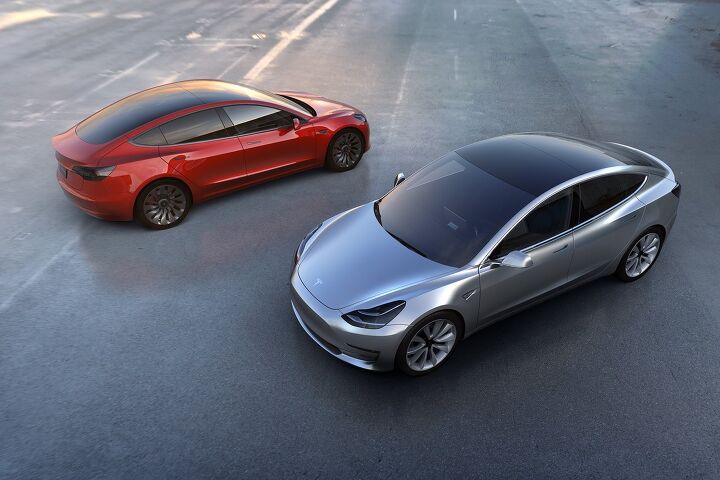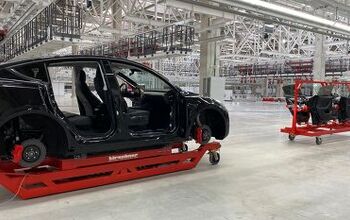QOTD: Do You Want a Tesla Model 3 or an Electric BMW 3 Series?
BMW intends to unveil an all-electric 3 Series at the Munich Auto Show in September, according to German business newspaper Handelsblatt.
Will BMW report the intake of hundreds of thousands of $1,000 deposits for an all-electric, next-generation BMW 3 Series? Probably not.
But which car are you more likely to purchase: a 3 Series EV from long-heralded BMW with roughly 250 miles of range, or the much-hyped, oft-discussed Model 3 from nascent Tesla, production of which should be in full swing by the time the 3 Series EV appears?
This may be the next Mustang vs. Camaro, a quasi Accord vs. Camry battle to end all Accord vs. Camry battles, an F-150 vs. Silverado skirmish without the 87 octane.
If the next iteration of the 3 Series, codename G20, was designed from the get-go to utilize a pure electric drivetrain, the 3 Series, a global premium performance leader, could be poised to steal some of Tesla’s thunder.
Yet part of Tesla’s appeal is the anti-establishment tenor of the company.
Say what you will about the poor quality of construction, the flighty ambitions, the delays, the odd decisions, and the lack of clear sales reporting ( there’s plenty to say). But it’s difficult to deny that Tesla has its finger on the pulse of a certain demographic, and it’s not a small demographic. Is a regular, entry-level BMW sedan that looks like every other 3 Series really going to make the same statement that a Tesla Model 3 could?
Moreover, Tesla is fostering a reputation, deserved or not, as the electric automaker, with some consumers perceiving Tesla to be at the leading edge of electric cars simply because Tesla doesn’t build anything other than electric cars.
The question in the mind of the average car buyer isn’t whether they want an electric car from an established automaker, an electric version of one of the world’s most popular premium vehicles. Rather, the average car buyer is attempting to determine just how badly he or she wants to buy a semi-affordable electric car from an electric car specialist.
But what about you? BMW 3 Series EV or Tesla Model 3?
And while you’re waiting on both, don’t forget that there’s already a BMW 33oe iPerformance, a $45,095, 248-horsepower plug-in hybrid that operates in EV mode for up to 14 miles.
That’s likely an insufficient partway measure for next year’s Model 3 buyer. 6 percent of U.S. 3 Series buyers in the first five months of 2017 chose the plug-in model, according to HybridCars.com.
[Images: BMW, Tesla]
Timothy Cain is a contributing analyst at The Truth About Cars and Autofocus.ca and the founder and former editor of GoodCarBadCar.net. Follow on Twitter @timcaincars.
More by Timothy Cain
Latest Car Reviews
Read moreLatest Product Reviews
Read moreRecent Comments
- EBFlex Interesting. We are told there is insatiable demand for EVs yet here is another major manufacturer pivoting away from EV manufacturing and going to hybrid. Did these manufacturers finally realize that the government lied to them and that consumers really don’t want EVs?
- Kwik_Shift_Pro4X What's worse than a Malibu?
- MaintenanceCosts The current Malibu is poorly packaged; there's far more room inside a Camry or Accord, even though the exterior footprint is similar. It doesn't have any standout attributes to balance out the poor packaging. I won't miss it. But it is regrettable that none of our US-based carmakers will be selling an ordinary sedan in their home market.
- Jkross22 You can tell these companies are phoning these big sedans in. Tech isn't luxury. Hard to figure out isn't luxury.This looks terrible, there are a lot of screens, there's a lot to get used to and it's not that powerful. BMW gave up on this car along time ago. The nesting doll approach used to work when all of their cars were phenomenal. It doesn't work when there's nothing to aspire to with this brand, which is where they are today. Just had seen an A8 - prior generation before the current. What a sharp looking car. I didn't like how they drove, but they were beautifully designed. The current LS is a dog. The new A8 is ok, but the interior is a disaster, the Mercedes is peak gaudy and arguably Genesis gets closest to what these all should be, although it's no looker either.
- Ajla My only experience with this final version of the Malibu was a lady in her 70s literally crying to me about having one as a loaner while her Equinox got its engine replaced under warranty. The problem was that she could not comfortably get in and out of it.



































Comments
Join the conversation
I would choose Tesla. First it is local company and second BMW is for unwashed masses and hairdresser.
I know this site has it in for Tesla. But let's also list some of the advantages including constantly improving software; the knowledge that if autopilot driving comes, you can have the stuff for it now; etc. I am stuck with my mediocre Toyota interface until I replace the car. Other people are in the same situation.